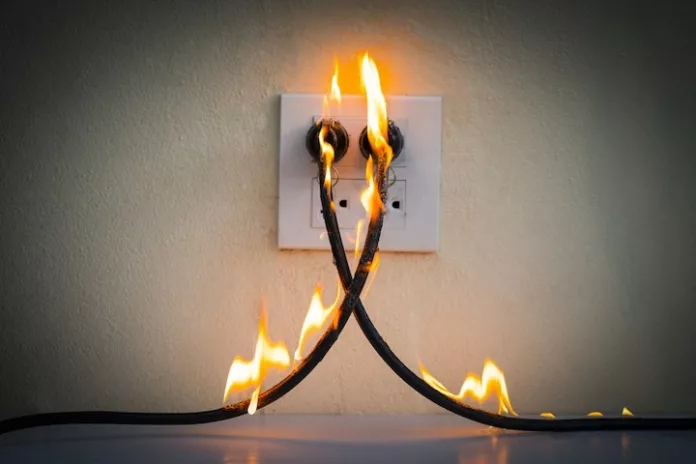By Samantha Simon
As summer temperatures soar to all-time highs, residents are raising concerns about the increased risk of electrical fires.
The combination of scorching heatwaves, overburdened electrical systems and appliances, power fluctuations due to tropical storms, and human negligence can end in tragedy.
To ensure the safety of your homes and loved ones, it is essential to understand the risks and take necessary precautions.
Orville Simon, an electrician for over 20 years, shared some vital steps to safeguard against electrical fires during hot weather.
1. Schedule a professional electrical inspection
It is crucial to have a skilled electrician inspect your home’s electrical system, particularly if it is an older property.
Over time, electrical components can deteriorate, leading to potential fire hazards. An inspection can also identify any faulty wiring, overloaded circuits, or outdated equipment, allowing you to rectify these issues before they escalate, and can also help you save money on your electrical bill through upgrades to your system.
2. Install surge protectors
Surge protectors are electrical safety devices that protect against electrical shock and potential fire hazards. These devices monitor the flow of electricity and immediately shut off the power if they detect a power surge.
Install surge protectors in areas where heavy power consuming appliances are in regular use, such as kitchens, bathrooms, and outdoor outlets. This will reduce the chance of your devices being damaged due to any changes in voltage, especially during the hurricane season when power may go out or fluctuate.
3. Avoid overloading electrical outlets and extension cords
Excessive use of extension cords and power strips can overload circuits, increasing the risk of overheating and fires. Spread out electrical loads across different outlets and avoid connecting multiple high-powered devices to a single power source.
Also, be sure to check the power rating of your extension cords and power strips to avoid burdening them with more than their recommended power rating. If you require additional outlets, consult an electrician to install them safely.
4. Inspect electrical cords and plugs regularly
Inspect all electrical cords and plugs for signs of wear, fraying, or damage. Replace any damaged cords immediately, as they can create sparks and ignite nearby materials. Also, avoid running cords under carpets or rugs, as the heat buildup can pose a fire hazard.
If you have pets, make sure they do not chew on wires or electrical appliances as this can expose them to potential harm and create further risk of fire should they come into contact with a direct current.
Furthermore, ensure that cords are not pinched by furniture or tangled, as this can cause overheating.
5. Practice appliance safety
During hot weather, air conditioners, fans, and other cooling devices are heavily used. Ensure these appliances are plugged directly into wall outlets and not overloaded power strips. Clean air conditioner filters regularly to prevent dust buildup, which can increase the risk of overheating.
Beware of fans that may be running slower than usual as this may be a sign that bearings or motors are lacking lubrication, or there may be internal damage that can cause a fire. Unplug appliances when not in use and avoid leaving them running overnight or unattended.
6. Be mindful of outdoor electrical safety
If you have outdoor electrical outlets or equipment, take precautions to safeguard against potential fire risks. Ensure all outdoor outlets are weatherproof and covered with appropriate protective enclosures.
Avoid using electrical devices or power tools in wet or damp conditions, and keep them away from sources of water.
7. Install smoke detectors and fire extinguishers
Smoke detectors are essential for early fire detection, giving you and your family valuable time to evacuate safely. If you live in a multilevel home, be sure to install smoke detectors on every floor, especially in bedrooms and near electrical panels. The kitchen is not the only place that should be fitted with these devices.
Additionally, keep fire extinguishers in easily accessible locations and ensure everyone knows how to use them effectively.
8. Keep flammable items away from outlets & appliances
Items such as cardboard boxes, paper, clothing and other flammable materials can act as fuel for a fire should your outlets or electrical appliances have a short or produce sparks. These items may also cause wires to not fit correctly into outlets, causing a surge buildup that can cause outlets to overheat and combust, or leave pets and humans at risk of being shocked.
9. Educate your family about electrical hazards
Proper education and awareness are paramount in preventing electrical fires. Teach your family members about the potential hazards associated with electricity and the precautions they should take. Emphasize the importance of never attempting electrical repairs without professional assistance.
Furthermore, ensure that your family has an emergency plan, which includes how to handle fires.
By implementing these precautionary measures, you can significantly reduce the risk of electrical fires during hot weather.
Stay vigilant, prioritise safety, and don’t hesitate to seek professional help if you suspect any electrical issues in your home.
Together, we can ensure a safer and more secure environment for everyone this summer and beyond.

